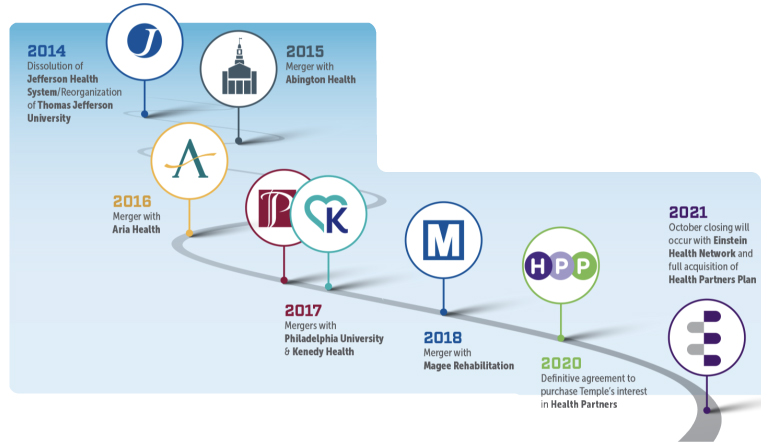Dr. Stephen Klasko is Exclusively Represented by CAL Entertainment
By MJ Galbraith for HealthSpaces
When Dr. Stephen Klasko took to the stage at HealthSpaces, he started by playing a song: “You Can’t Always Get What You Want” by the Rolling Stones, one of his favorites.
As president and CEO of Thomas Jefferson University and Jefferson Health from 2013-2021, a best-selling author, and with a track record of success that resulted in him being ranked #2 on Modern Healthcare’s “100 Most Influential People in Healthcare” in 2018 (a list his name has appeared on multiple times), Dr. Klasko has accomplished a lot in his career. He’s made a name for himself by reimagining the way the healthcare industry does business, inspired by Silicon Valley innovators like Steve Jobs.
Well, Steve Jobs and the Rolling Stones.
When Dr. Klasko was starting his career in 1979, he wanted to see his fellow physicians embrace change, be more optimistic about the future, and work toward eliminating inequities in the healthcare system. But in 2021, he says, Mick Jagger is still out there singing about how he can’t always get what he wants and physicians are still pessimistic about the future of their industry. Technology might allow us to shop online while we’re binge-watching TV shows, but it still takes forever to book a doctor’s appointment, and health inequities in Dr. Klasko’s home base in Philadelphia are as prevalent as ever.
That all could change — and soon. Dr. Klasko asked the crowd to fast forward to 2030, where a pandemic only lasts two days because healthcare doesn’t start in the hospital anymore. Just about everybody will have a wearable, which connects directly with the Internet of Things, communicating with doctors, employers, and more. Advanced bioprocessing techniques allow for the fast development of vaccines, even faster than those developed for COVID-19. And healthcare has gone from a fragmented sick-care model to starting at home.
“By 2030, healthcare has not just broken but smashed the cost, access to quality, and patient-experience curve, but it happens through a series of really disruptive events and creative partnerships,” Dr. Klasko said.
He points to Steve Jobs and Apple as the way healthcare will get there. Jobs, as Dr. Klasko tells it, made it his mission to take what would be obvious ten years from now and to do it today. The iPod, for example, wasn’t just an MP3 player but a digital revolution. Not being afraid to disrupt the entire healthcare industry, much in the way tech companies like Apple did, is paramount to its future.
“What we’ve neglected is a very, very important part of disruption. We like to talk about disruption because it sounds cool, but true disruption means threatening your existing product line and your past investments,” Dr. Klasko said.
“Breakthrough products disrupt your current lines of business. That’s true in my business, that’s true in the real estate business, that’s true in half the conference business, and that’s really what happened when you think about who got it and who didn’t when Steve Jobs disrupted the computer industry.”
The Old Math and the New Math
From when Dr. Klasko arrived at Jefferson, he spearheaded seven mergers with various hospitals, rehab centers, and insurers, and even one of the top fashion schools in Philadelphia University, leading to the creation of the first fashion design curriculum at a medical school.
But, he says, “probably more important than that was really ripping off Steve Jobs’s model around the old math and the new math, and in 2013 going to my faculty and saying that our old math is in-patient revenue and out-patient revenue, NIH funding, and in-person tuition. Our new math is innovation, strategic partnerships, and philanthropy.”
Under his leadership, Jefferson Health grew from three hospitals to 14, its revenue growing from $2.2 billion to $5.1 billion. In 2017, Jefferson Health signed the largest risk-shared partnership in the U.S. with GE Healthcare. Venture capital and transformational gifts, like a $110 million donation in 2014, have followed in abundance.

In treating the nearly 200-year-old institution like a start-up, Dr. Klasko successfully transformed Jefferson Health through strategic partnerships and innovation. Embracing next-wave technologies like artificial intelligence (AI) and the Internet of Things will allow the entire healthcare industry to change and grow, much in the way Jefferson Health already has.
Technology and Innovation
Wearables will play a big part in the future of the healthcare industry. When a new car loses air in one of its tires overnight, the car lets you know in the morning; the proliferation of wearables will allow for similar results in people. And Jefferson’s new fashion curriculum is leading to the design of those very wearables.
Much in the way successful companies like Airbnb and Warby Parker have used technology to improve customer service, healthcare must do the same. Advancements in data and technology will lead the way and partnering healthcare companies with Silicon Valley tech firms will help us get there.
“We call it the ‘Space Station:’ the space between healthcare at home and what will be our 18 — and probably less, when push comes to shove — general acute care facilities,” Dr. Klasko said. “It basically creates a whole different model of a healthcare building around convenience, excellence, technology, and integration.”
Still, it’s important to recognize that while computers may be smarter than us, they’ll never be as wise. That’s why Dr. Klasko put an emphasis on recruiting students with the “soft skills” like empathy and understanding — after meeting the necessary “hard skill” requirements, of course. And improving diversity efforts at the school helps to eliminate racial inequities in healthcare in the region.
Ten Years from Now Starts Today
It’s not easy to disrupt an industry as big and established as healthcare. You can’t have change without changing the DNA of your workforce, Dr. Klasko said. That’s why he spent much of his time trying to reach the workers “in the middle,” rather than the ones who agree and disagree with him. That’s where real change can happen. Over-communicating, too, has been his self-described savior — talking to workers at the hot dog stands, making playlists for his staff.
But it’s communicating with patients that remains the biggest hurdle, especially when it comes to issues of privacy and cybersecurity. The AI revolution has an opportunity to transform the industry, but it has its dangers, too. Patients won’t buy into wearables and share their personal data if companies don’t protect that information.
Technology, innovation, and strategic partnerships may be the future of the healthcare industry, but the time for change has already begun.
“We really have to start now,” Dr. Klasko said. “Because if we don’t do it, then others will do it for us.”

